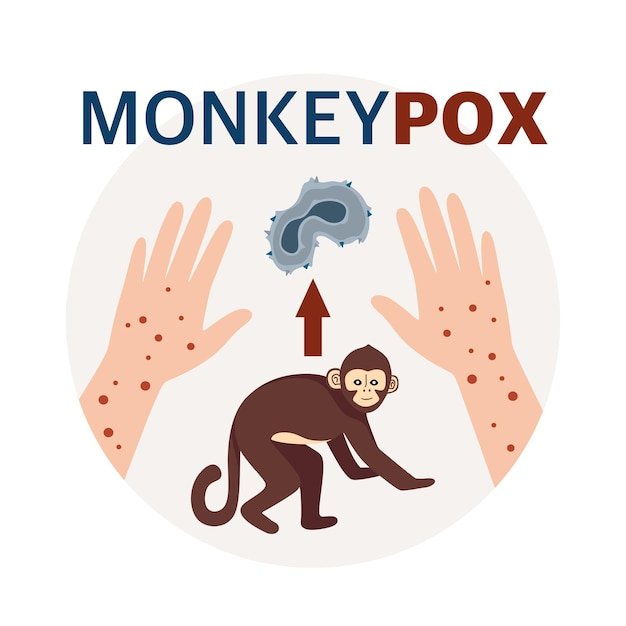Monkeypox 101: Key Facts and Tips to Keep You Protected
Hey! You’ve probably heard about Monkeypox in the news or on social media and might have some questions about it. Don’t worry, I’m here to explain what it is, how it spreads, and how to protect yourself.
**What is Monkeypox?**
Monkeypox is a viral disease related to smallpox, though much less severe. It was first discovered in 1958 in monkeys, which is where the name comes from. It’s a rare disease, and most people recover without needing special treatment.
The virus can spread from animals to humans, and between people too, but it's not highly contagious like the flu.
**Where Does Monkeypox Come From?**
Monkeypox was first found in Africa, mainly in wild animals like rodents. It usually stays in certain parts of Africa but has recently spread to other countries.
**Symptoms of Monkeypox**
Here’s what to look for if you think you might have Monkeypox:
Fever
Headaches
Muscle aches
Swollen lymph nodes (small glands that can get bigger)
Rash: This starts as small bumps that look like pimples or blisters and can eventually scab over.
Most people have mild symptoms and recover on their own, but young children or those with weaker immune systems may experience more serious complications.
**How Does Monkeypox Spread?**
Monkeypox spreads in a few ways:
Direct contact with someone’s rash or body fluids.
Touching contaminated objects like bedding or towels.
Through respiratory droplets, though this is less common.
It can also spread from animals through bites, scratches, or handling meat from infected animals.
**What About the Recent Outbreak?**
In 2022, there was a global outbreak of Monkeypox. This time, the virus spread between people in different countries, not just in areas where it's common.
**How is Monkeypox Treated?**
There’s no specific treatment for Monkeypox, but doctors can help manage symptoms, like reducing fever or keeping the rash clean. For severe cases, antiviral medications might be used.
**How to Prevent Monkeypox**
To protect yourself:
Avoid close contact with anyone who has the virus.
Practice safe sex.
Wash your hands regularly.
Clean and disinfect surfaces.
If you're at risk, you might want to talk to your doctor about getting the smallpox vaccine, which also protects against Monkeypox.
**Key Points to Remember:**
Monkeypox is a viral disease that can spread from animals and between people.
Common symptoms include fever, headaches, swollen lymph nodes, and a rash.
Most people recover on their own without needing special treatment.
Prevent infection by avoiding close contact, practicing good hygiene, and disinfecting surfaces.
Staying informed is the best way to protect yourself and others!
**What is Monkeypox?**
Monkeypox is a viral disease related to smallpox, though much less severe. It was first discovered in 1958 in monkeys, which is where the name comes from. It’s a rare disease, and most people recover without needing special treatment.
The virus can spread from animals to humans, and between people too, but it's not highly contagious like the flu.
**Where Does Monkeypox Come From?**
Monkeypox was first found in Africa, mainly in wild animals like rodents. It usually stays in certain parts of Africa but has recently spread to other countries.
**Symptoms of Monkeypox**
Here’s what to look for if you think you might have Monkeypox:
Fever
Headaches
Muscle aches
Swollen lymph nodes (small glands that can get bigger)
Rash: This starts as small bumps that look like pimples or blisters and can eventually scab over.
Most people have mild symptoms and recover on their own, but young children or those with weaker immune systems may experience more serious complications.
**How Does Monkeypox Spread?**
Monkeypox spreads in a few ways:
Direct contact with someone’s rash or body fluids.
Touching contaminated objects like bedding or towels.
Through respiratory droplets, though this is less common.
It can also spread from animals through bites, scratches, or handling meat from infected animals.
**What About the Recent Outbreak?**
In 2022, there was a global outbreak of Monkeypox. This time, the virus spread between people in different countries, not just in areas where it's common.
**How is Monkeypox Treated?**
There’s no specific treatment for Monkeypox, but doctors can help manage symptoms, like reducing fever or keeping the rash clean. For severe cases, antiviral medications might be used.
**How to Prevent Monkeypox**
To protect yourself:
Avoid close contact with anyone who has the virus.
Practice safe sex.
Wash your hands regularly.
Clean and disinfect surfaces.
If you're at risk, you might want to talk to your doctor about getting the smallpox vaccine, which also protects against Monkeypox.
**Key Points to Remember:**
Monkeypox is a viral disease that can spread from animals and between people.
Common symptoms include fever, headaches, swollen lymph nodes, and a rash.
Most people recover on their own without needing special treatment.
Prevent infection by avoiding close contact, practicing good hygiene, and disinfecting surfaces.
Staying informed is the best way to protect yourself and others!



